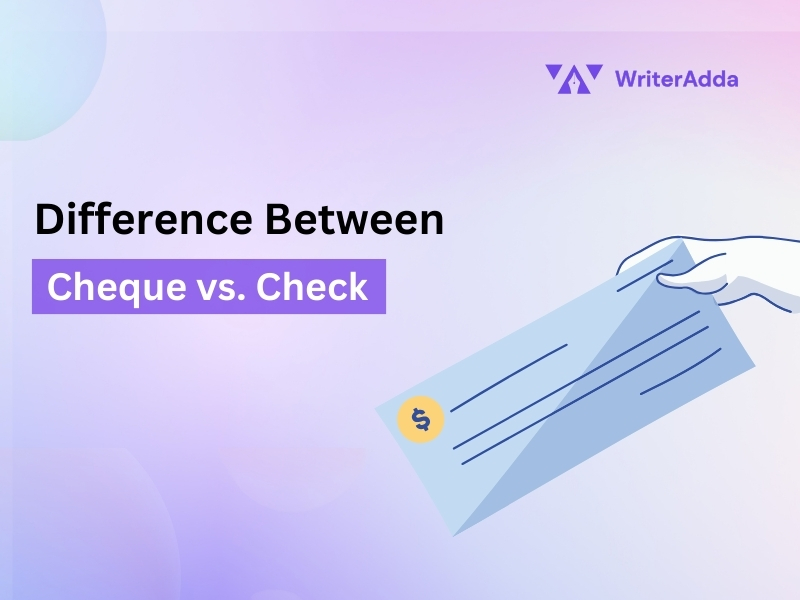While many words in the English language have been adopted with variations in different regions, few cause as much confusion as “check” and “cheque”. While used interchangeably in various contexts, they are distinguished by their spelling, their meaning, and regional usage. This article aims to delve into the meanings, differences, usages, and connotations of “cheque” versus “check” and its usage across different countries.
A Homophonic Pair
“Check” and “cheque” are classic examples of what linguists refer to as homophones. Despite their different spellings and regional usages, when spoken aloud, they sound identical. This phonetic similarity is what classifies them as homophones, which can occasionally lead to confusion in verbal communication, especially when the context is not explicitly stated.
What are Homophones?
Homophones are words that sound the same when pronounced but may have different meanings, spellings, or origins. Derived from the Greek words “homos” (same) and “phone” (voice or sound), homophones underscore the intricate nature of language and how varied spelling can still lead to the same auditory expression.
Examples of homophones are abundant in the English language. Consider pairs like “flour” and “flower,” “two” and “too,” or “bare” and “bear.” Each of these pairs sounds identical when spoken, yet their meanings and uses are distinct. Such characteristics of the language often present challenges for learners and writers but also add depth and richness to linguistic expression.
Meaning of Check and Cheque
When examining “cheque” and “check” from a grammatical standpoint, it is critical to understand their nuanced utilization in sentences and how their implications can differ contextually, based on regional and linguistic norms.
Use of Cheque
In British English, “cheque” exclusively refers to a financial instrument. It’s a noun that represents a document allowing the transfer of funds from one individual to another. When utilized in sentences, it acts as a subject or an object.
E.g., Sarah wrote a cheque for £500 to cover the cost of the repairs.
Use of Check
In American English, “check” maintains its financial meaning but also serves as a versatile word, functioning as a noun, verb, or even an interjection in varied contexts. For instance:
Certainly! The word “check” in American English exhibits a multifaceted nature, with its meaning shifting based on its grammatical role:
- As a noun: “Check” signifies a written order directing a bank to pay money.
E.g., He gave me a check for $100.
Here, the “check” refers to a document representing a sum of money.
- As a verb: In this form, “check” denotes the act of examining, verifying, or controlling something.
E.g., Check the oil level before starting the engine.
In this context, “check” implies verifying or ensuring that the oil level is adequate.
- As an interjection: When used as an interjection, “check” expresses agreement, understanding, or acknowledgment.
E.g., “We need to leave at 5 pm.” “Check!”
Here, “check” is an informal affirmation, similar to saying “got it” or “understood.”
Correct Usage
When interacting in or with British English-speaking regions or adhering to international English standards, the appropriate term is “cheque.” This accuracy is crucial in formal writings, academic publications, and legal documents to maintain linguistic integrity.
- Correct: Could you please issue a cheque for the due amount?
- Incorrect: Could you please issue a check for the due amount? (When adhering to British English norms)
Conversely, when in the United States or in contexts influenced by American English, “check” is the correct term, especially in everyday language and informal communication, as well as in formal settings.
- Correct: I’ll write a check for the groceries.
- Incorrect: I’ll write a cheque for the groceries. (When adhering to American English norms)
Difference between Check and Cheque
At the intersection of finance and linguistics, the terms “cheque” and “check” stand out as intriguing examples of how words, despite having similar meanings, can manifest differently based on historical and regional contexts.
“Cheque” and “check,” both tied to the concept of a written order for a bank to pay a specified sum, epitomize the confluence of functionality with language evolution. While their core purpose remains unaltered across borders, their spelling, and subsequently their identity, is molded by the linguistic legacy of the regions they’re used in.
Historically, the divergence between British and American English can be attributed to various factors, including but not limited to, colonization, cultural influences, and the desire for linguistic independence. As American English began to carve its own identity, many words underwent spelling simplifications or changes, either to assert independence from British norms or to adopt a more phonetic structure. “Check” is a reflection of this transformation.
In the realm of British English and many of its derivative forms across former colonies and the Commonwealth, “cheque” remains the standard. The term carries with it not just the essence of its function but also the legacy of a language that has been globally influential for centuries. On the other hand, “check” in American English, while holding onto the foundational meaning, also becomes emblematic of a nation’s journey to create its distinct linguistic footprint.
While “cheque” and “check” might be functionally synonymous, they are also linguistic markers, bearing testament to the evolving journey of the English language and the cultural narratives intertwined with it.
Cheque vs. Check in Different Countries
The choice between “cheque” and “check” is largely contingent upon the prevalent form of English in a given region.
- United States: Americans use “check” both in the financial context and in other general contexts when used as a verb or an interjection. So, if someone in the U.S. mentions they’re writing a check, they’re referring to the banking instrument. But when they say they’re going to check on something, it usually denotes they’re verifying an event, person, or situation.
- United Kingdom, Canada, and other Commonwealth Nations: These countries use “cheque” to denote the financial instrument. However, they also use “check” but in different contexts, such as in “reality check” or “checklist”. “Check” when used in non-financial contexts is accepted alike universally.
- Australia: While Australia traditionally followed the British “cheque”, there’s been a noticeable shift. With the influence of American culture and language, it’s not uncommon to see both spellings in use.
Usage of Cheque vs. Check
Financial Transactions
Both “cheque” and “check” operate as trusted alternatives to direct cash payments and electronic methods like debit or credit cards. For large amounts, many individuals and businesses lean towards these written instruments due to the inherent security they provide. Unlike cash, which is susceptible to theft without a trace, a “cheque” or “check” leaves a documented trail. This trail not only establishes accountability but also facilitates easier tracking and reconciliation of funds.
“Check” as a Verb
While “cheque” is firmly rooted in the financial world, “check” possesses a chameleonic nature in American English. As a verb, “check” transcends its financial connotation. It can mean to verify, as in “check the facts,” to restrain, as in “check one’s enthusiasm,” or even to mark or tick, as in “check the items on the list.” This versatility adds layers to the term, making it an integral part of the American English lexicon beyond monetary matters. Even the British favor the “check” spelling when used outside of the financial context.
Common Phrases That Use “Check”
The word “check” in American English is more than just a nod to financial transactions. It’s an embodiment of versatility, permeating into various aspects of daily life, especially when incorporated into compound phrases or idioms. Let’s explore some of these common usages:
Check-in: Derived from the idea of verification, “check-in” generally denotes the process of confirming one’s arrival or presence. In the context of air travel or hotel stays, it’s the act of registering your arrival. Similarly, in digital spaces, “checking in” can mean updating someone about one’s status or well-being.
Check-up: A “check-up” is a comprehensive assessment or examination, usually referring to a medical review undertaken to ensure health or diagnose potential issues. It embodies the idea of verifying or ensuring that everything is in order.
In-check: To keep something “in-check” means to maintain control or restraint over it. It’s a reminder of the term’s origins in the game of chess, where the primary objective is to “check” the opponent’s king, restricting its movements.
Check something off: When you “check something off,” you’re marking it as completed, usually in the context of a list. This act signifies that the task or item has been verified as done.
Check-out: This term has multiple interpretations. In retail or digital commerce, “check-out” denotes the process of finalizing a purchase. In hotels, it refers to the act of confirming one’s departure. Moreover, it can also mean to investigate or take a look at something, as in, “Check out that new movie.”




